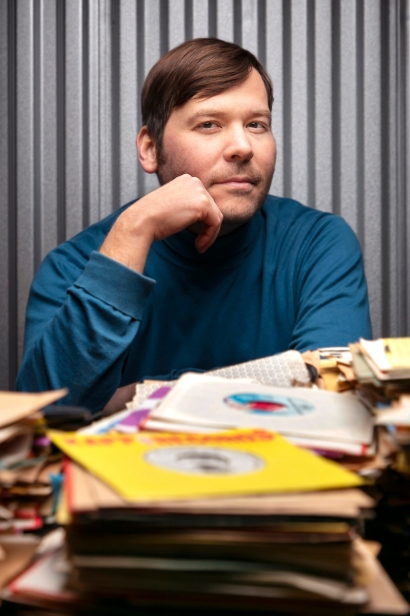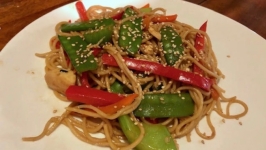1990 Was Complicated
I turned 15 at the end of summer, 1990. Freshman year was thankfully behind me—a year where I had lost most of my skateboarding/punk/metal music-oriented friends to the high school football team. Obsessively practicing the bass guitar (10+ hours a day when possible) to fill my newly freed up social calendar became my coping mechanism. That and eating mountains, like actual mountains, of fast food.
I had put on 30 pounds since eighth grade. Not in the healthy, grew-a-few inches, girls-starting-to-notice-me way. These were food court, drive through, carry out pounds. Chili cheese pounds. I had a dresser drawer completely full of Taco Bell wrappers, and could easily drink a six pack of Mountain Dew a day. I mourned the McRib’s seasonal departure, and can still sing you the Cheddar Melt’s theme song. Of course, the extra weight just led to social anxiety and pushed me further into my solitary music studies.
Early in the semester, one of my few friends from school, John, called me about joining a band he was starting. He participated in the vivid all-ages club scene—Sunday night dance parties that drew nascent ravers, aspiring goths, punks and hardcore kids from around the city. John had been using the scene as a casting audition for what he envisioned would be the coolest of the ‘cool kids’ bands. Not really sure how I fit into that scheme, musical talent seemed to factor very little in his ideas about who was qualified for which roles in the band. He must’ve just needed a bass player really badly. Our initial lineup had a mixed race and gender makeup, and it was this diversity of my new default social group (the band) and the friends and assorted weirdos that I would meet through them that would start my path towards vegetarianism and ultimately veganism.
My very first pomegranate was a gift from our shy, dreadlocked singer and guitarist. He had snagged it from his after-school job at the Outpost Co-op. I first heard the word “vegan” from our female singer/keyboardist while she complicatedly ordered Taco Bell to exclude any animal products. A group of kids I met at one of our first gigs were eating room-temperature vegan “not dogs” as snacks while we walked around one summer night (unsurprisingly, the artificial charms of hot dogs were the first meat-based American diet staple to be near-perfectly reproduced by vegan food scientists). And then, one Saturday afternoon after practice, I returned home to a spread of Speed Queen BBQ—a special treat that my Dad picked up for me—and said, “Thanks Dad, but I’m a vegetarian.”
This isn’t to say that all of the influences that would eventually lead me to veganism were external. I think most people grapple with the morality and ethics of eating animals at some time in their life, and I was no different. But in this case the concept of agency, in the sociological sense, was more in the forefront. The idea that the person I’d be as a 20, 30 or 40 year old wasn’t just randomly left to circumstance, but something that I was in complete control of was very attractive to me. Vegetarianism was my first ticked box. I wanted to start there. My logic was, “Why do we start as omnivores and then wrestle with whether or not to exclude animal products? Why not start without them and decide if we need to add them?” I still think that is a perfectly reasonable stance.
The landscape of vegetarian dining of Milwaukee in 1990 was a far cry from that of modern times. It was primarily a life of exclusion. American food culture had been pushing away from meals based on vegetables and grains since before my friends and I were born. Thankfully, I lost a lot of weight with my newfound lifestyle.
My eventual salvation came by way of the handful of small immigrant restaurants dotting Milwaukee’s bohemian East Side. Most of the cultures that these chef/owners had come from had long, vibrant vegetarian traditions deeply embedded in their cuisine. Over the next few years, my palate would be expanded exponentially by Thai, Nepalese, Lebanese, Malaysian, Indian, Sri Lankan, Chinese and Mexican dishes. Instead of exclusion, I was learning about and eating new ingredients.
By the time I was 17, we had begun traveling to both coasts on tour with the band. The DIY punk network was invaluable at that time for its indie-web of venues and crash pads. It was also a pre-internet, pre-smartphone resource for how to eat veg-friendly while traveling. Hare Krishna temples had oddly become ‘must-hit’ spots for many traveling bands in this era for their Sunday Prasadam: free buffet-style vegetarian feasts.
While vegetarian and vegan ideologies amongst all American underground music scenes of the early 1990’s were very common, for some of them it was a fundamental tenet. Many musical groups actually included themes of a clean and ethical diet into their lyrics, which were often passed out to the crowd before a band’s set started.
We now live in a world where almost everyone reads their food labels wanting to know what they are consuming, and the labels themselves have been legally mandated to contain much more information than in the 90’s. Almost all of my friends, vegan or omni, seem to spend a lot more time thinking about what they eat and where their food comes from. Standing in a random suburban, not particularly ‘specialty’ grocery store and seeing the range of healthy, organic and international ingredients available, I have to think, hey, we won!






